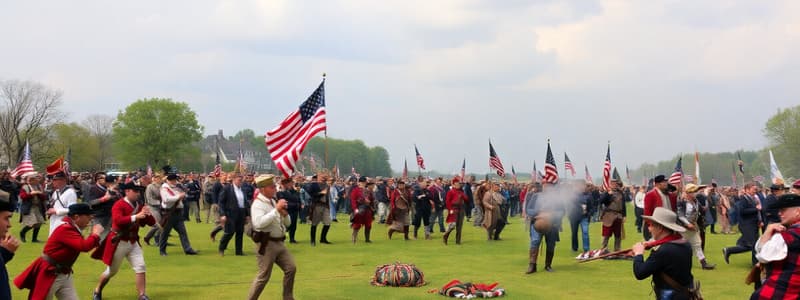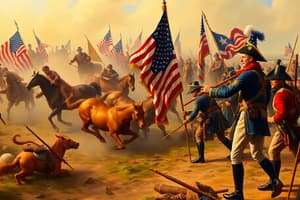Podcast
Questions and Answers
What was the primary motive behind Madison's belief regarding British policy prior to the War of 1812?
What was the primary motive behind Madison's belief regarding British policy prior to the War of 1812?
- To expand British territory in America
- To secure better trade routes with France
- To eliminate the US as a maritime trading rival (correct)
- To support Native American autonomy
What geographic feature allowed the United States to achieve some success in the War of 1812?
What geographic feature allowed the United States to achieve some success in the War of 1812?
- The Great Lakes
- The St. Lawrence River
- The Mississippi River
- Lake Erie (correct)
Which event marked the United States' first significant military embarrassment in the War of 1812?
Which event marked the United States' first significant military embarrassment in the War of 1812?
- The surrender of General Hull at Detroit (correct)
- The defeat at Queenston Heights
- The Battle of Lake Erie
- The British capture of Washington D.C.
What was the outcome of the Battle of the Thames?
What was the outcome of the Battle of the Thames?
Which general reported the famous victory statement, 'We have met the enemy, and they are ours'?
Which general reported the famous victory statement, 'We have met the enemy, and they are ours'?
What factor significantly contributed to the challenges faced by the United States military early in the War of 1812?
What factor significantly contributed to the challenges faced by the United States military early in the War of 1812?
What was the initial American strategy regarding Canada during the War of 1812?
What was the initial American strategy regarding Canada during the War of 1812?
Which issue did Madison NOT believe was central to the dispute leading to the War of 1812?
Which issue did Madison NOT believe was central to the dispute leading to the War of 1812?
What aspect of the Canadian campaign did the United States underestimate?
What aspect of the Canadian campaign did the United States underestimate?
What was the significance of the U.S. defeat at Queenston Heights?
What was the significance of the U.S. defeat at Queenston Heights?
What significant action contributed to Andrew Jackson becoming a national hero?
What significant action contributed to Andrew Jackson becoming a national hero?
What was the primary outcome of the Treaty of Ghent?
What was the primary outcome of the Treaty of Ghent?
What was a major complaint of New Englanders during the War of 1812?
What was a major complaint of New Englanders during the War of 1812?
What did the Federalists propose at their special convention in Hartford, Connecticut?
What did the Federalists propose at their special convention in Hartford, Connecticut?
Which factor affected the British decision to become more conciliatory in peace negotiations?
Which factor affected the British decision to become more conciliatory in peace negotiations?
What nickname did some New Englanders give the War of 1812?
What nickname did some New Englanders give the War of 1812?
What economic situation emerged in New England due to the refusal of banks to accept paper money?
What economic situation emerged in New England due to the refusal of banks to accept paper money?
When was the Treaty of Ghent signed?
When was the Treaty of Ghent signed?
Who led the American commissioners during the negotiations at Ghent?
Who led the American commissioners during the negotiations at Ghent?
What did the Treaty of Ghent fail to address?
What did the Treaty of Ghent fail to address?
What event prompted Napoleon to abdicate the French throne in April 1814?
What event prompted Napoleon to abdicate the French throne in April 1814?
What action did Dolley Madison take before fleeing Washington, D.C.?
What action did Dolley Madison take before fleeing Washington, D.C.?
Which American fort was bombarded by the British fleet on September 13, 1814?
Which American fort was bombarded by the British fleet on September 13, 1814?
What became of the poem that Francis Scott Key wrote after witnessing the battle at Fort McHenry?
What became of the poem that Francis Scott Key wrote after witnessing the battle at Fort McHenry?
Which American commander achieved a decisive victory against General Sir George Prevost at Plattsburgh?
Which American commander achieved a decisive victory against General Sir George Prevost at Plattsburgh?
What was the significance of the earlier American victories near Niagara?
What was the significance of the earlier American victories near Niagara?
What was Andrew Jackson’s achievement prior to the Battle of New Orleans?
What was Andrew Jackson’s achievement prior to the Battle of New Orleans?
How did Andrew Jackson's defensive strategy contribute to the outcome of the Battle of New Orleans?
How did Andrew Jackson's defensive strategy contribute to the outcome of the Battle of New Orleans?
What was the result of the Battle of New Orleans?
What was the result of the Battle of New Orleans?
What was the size of the British force that landed near New Orleans in December 1814?
What was the size of the British force that landed near New Orleans in December 1814?
Flashcards are hidden until you start studying
Study Notes
Causes of the War
- The War of 1812 arose primarily from disputes over maritime trade and British policies aimed at diminishing U.S. maritime competition.
- Britain was preoccupied with the Napoleonic Wars, viewing the conflict with the United States as a secondary concern.
The Canadian Campaign
- The U.S. targeted Canada for potential quick victory due to its small population and many American-born Canadians.
- Native American alliances supported the British, complicating U.S. military campaigns.
- General William Hull's American forces surrendered to a smaller British and Native American contingent after supply lines were cut.
Key Battles and Campaigns
- Early U.S. military efforts saw embarrassment, including defeats at Queenston Heights and reluctance from militias to advance towards Montreal.
- In 1813, the U.S. achieved a key victory at the Battle of Lake Erie, led by Captain Oliver Hazard Perry, who famously declared, “We have met the enemy, and they are ours.”
- The death of Tecumseh at the Battle of the Thames marked the decline of Native American resistance.
British Land Offensive
- With Napoleon's defeat in April 1814, Britain focused resources on the U.S. war effort.
- British troops captured Washington, D.C., burning the White House and other structures in retaliation for American actions in Canada.
- Francis Scott Key composed "The Star-Spangled Banner" during the bombardment of Fort McHenry, which was successfully defended.
Southern Campaign and the Battle of New Orleans
- The British aimed to seize New Orleans after earlier victories in Florida.
- General Andrew Jackson's defensive strategies resulted in a decisive U.S. victory at the Battle of New Orleans on January 8, 1815.
- The battle occurred after the signing of the Treaty of Ghent, highlighting communication delays.
Treaty of Ghent and War Settlement
- Peace negotiations began concurrently with British attacks, leading to the signing of the Treaty of Ghent on December 24, 1814, which ended hostilities without addressing key pre-war grievances.
- The absence of resolutions regarding impressment or maritime rights underscored a lack of clear victory for either side.
Federalist Response and Aftermath
- The 1812 election showcased Federalist gains but revealed deep regional divides, especially in New England, where opposition to the war grew.
- Federalists convened in Hartford to propose constitutional amendments limiting federal power, but the treaty's timing rendered their proposals unpopular, framing them as unpatriotic.
- New England benefited economically from war-related profits, contradicting local anti-war sentiments.
Studying That Suits You
Use AI to generate personalized quizzes and flashcards to suit your learning preferences.




